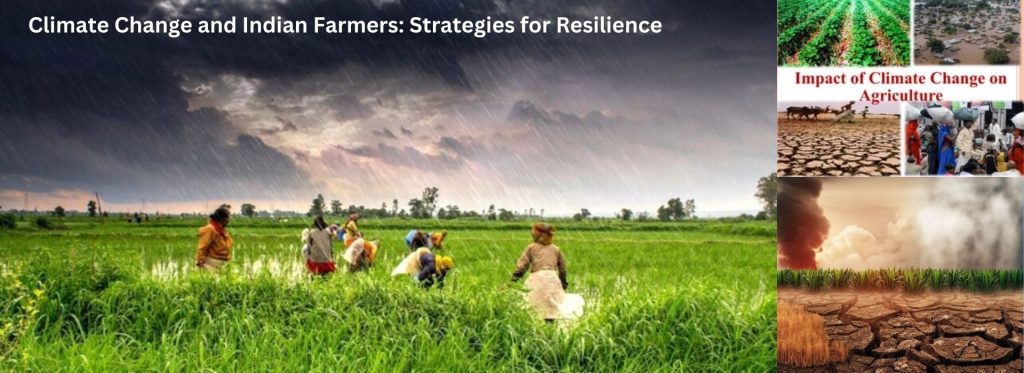Climate Change and Indian Farmers: Strategies for Resilience
India’s agriculture, deeply tied to the monsoons and other natural phenomena, is one of the sectors most vulnerable to climate change. Rising temperatures, erratic rainfall, and increasing occurrences of extreme weather events threaten food security, livelihoods, and the overall economy. Farmers, who form the backbone of the country’s agrarian society, are bearing the brunt of these changes.
This blog explores the challenges posed by climate change and strategies that can help Indian farmers build resilience.
The Impact of Climate Change on Indian Agriculture
- Erratic Monsoons
The Indian agricultural calendar heavily depends on monsoons, which are becoming increasingly unpredictable. Delayed or excessive rainfall disrupts sowing and harvesting, impacting crop yields. - Temperature Rise
Increasing temperatures reduce the productivity of key crops like wheat and rice. For instance, studies suggest that a 1°C rise in temperature can lead to a 4-5% reduction in wheat yields. - Extreme Weather Events
Cyclones, floods, and droughts are becoming more frequent and intense. These events devastate crops, deplete soil fertility, and strain water resources. - Soil Degradation
Climate change accelerates soil erosion and nutrient depletion, reducing agricultural productivity.
Strategies for Resilience
- Climate-Smart Agriculture (CSA)
- Adopting practices like precision farming, crop rotation, and intercropping helps optimize resource use.
- Introducing climate-resilient crop varieties that are drought-tolerant and pest-resistant can mitigate risks.
- Water Management
- Promoting micro-irrigation techniques like drip and sprinkler irrigation reduces water wastage.
- Creating rainwater harvesting systems and reviving traditional water bodies can ensure better water availability during droughts.
- Agroforestry
Integrating trees with crops provides multiple benefits, such as preventing soil erosion, improving biodiversity, and acting as carbon sinks.
- Insurance Schemes and Financial Support
- Schemes like the Pradhan Mantri Fasal Bima Yojana (PMFBY) help farmers recover losses due to weather anomalies.
- Improving access to affordable credit can reduce the financial burden during crises.
- Diversification
Encouraging farmers to diversify crops, including horticulture and livestock, can reduce dependency on climate-sensitive crops.
- Digital Tools and Forecasting
- Access to accurate weather forecasts helps farmers plan their sowing and irrigation schedules effectively.
- Mobile apps providing real-time advisory on pest control and crop management enhance decision-making.
- Community-Based Adaptations
- Strengthening farmer cooperatives can improve collective resilience.
- Community seed banks preserve native and climate-resilient varieties.
- Policy Support and Advocacy
- Governments must create policies promoting sustainable practices and support innovation in agricultural technologies.
- Collaboration with NGOs and international organizations can provide resources and expertise.
Success Stories
- Sikkim’s Organic Transition: The state’s shift to 100% organic farming has reduced dependence on chemical inputs, promoting sustainable agriculture.
- Watershed Management in Rajasthan: Community-led initiatives to conserve water and revive degraded lands have improved agricultural outcomes in drought-prone areas.
Conclusion
While the challenges posed by climate change are significant, Indian farmers can overcome these hurdles through innovative practices, supportive policies, and community-driven solutions. Building resilience is not just essential for farmers’ livelihoods but also for ensuring India’s food security and sustainable development goals.
Source link : View Article
Author
-

Krishi Bazaar is an organisation that focuses on the intersection of agriculture and climate change, providing actionable insights for farmers to adapt and thrive amidst environmental challenges. Their work aims to empower Indian farmers with knowledge and tools for resilience.



